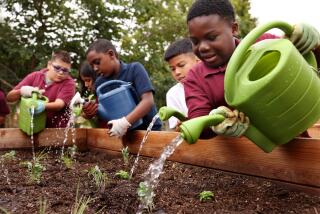Parents Aim for Democracy in the Classroom : Education: They hope to open a school where children will determine the course of their learning. Some officials express skepticism.
- Share via
SANTA CLARITA — A group of parents who say schools are too much like prisons hope to start a school this fall that places education in the hands of children.
The kids will decide what they want to learn and how to go about it.
“To me, it just makes so much sense,” said Hillary Teixeira, who wants to enroll her 4-year-old son in the new school this fall. “Children aren’t given enough respect in the traditional system. It’s human instinct, human nature, to learn and grow.”
Traditional school interrupts that natural drive or destroys it altogether, she said.
Organizers toured several homes last week looking for a large house to hold classes for students, who are expected to range in age from 5 to 19 years. They have applied to state authorities for nonprofit status and have decided on a name--Windy Valley School, a nod to the area’s gusting winds.
The parents estimate the school’s annual tuition will be between $2,000 and $3,500. They hope to eventually enroll up to 100 students. Six students have been confirmed and five more are expected to enroll once a site is found, Teixeira said.
Known as a democratic school, Windy Valley will be modeled after the Sudbury Valley School in Massachusetts. Organizers over the past year have been in contact with Sudbury founder Mimsy Sadofsky, who started her school in 1968.
“This school is based on the idea that people are born learning,” Sadofsky said.
Sudbury Valley School has 145 students and an adult staff of 11. During the past year, students worked on projects as varied as cooking, music composition and the construction of chain-mail armor.
Nearly a half-dozen democratic schools have appeared across the country in the last few years, Sadofsky said.
Mark Kelton, a teacher for eight years in Van Nuys, plans to work at Windy Valley.
“We don’t let children make choices because we’re afraid they will make the wrong decision,” he said. “That’s what learning is all about.”
Local public school officials, however, expressed skepticism over the idea that elementary school children should be responsible for their own education.
“I just don’t think it’s realistic,” said J. Michael McGrath, superintendent of the Newhall School District. “I just can’t see a first-grader knowing what they want to do.”
Carolyn Ellner, dean of Cal State Northridge’s education department, agreed: “A child of 10 really has no concept of what he or she needs in the future.”
But parents who are working to start the new school believe their children know better.
Chris McDowell pulled her 6-year-old son out of his kindergarten class after a half-year of instruction and plans to enroll him this fall in the democratic school. McDowell said she wants her children to learn through discovery rather than the “behavior modification” techniques used in public schools.
“Teachers were there, as far as I saw it, for crowd control,” McDowell said.
At democratic schools, there are no assignments, no grades and no grade levels. The hiring and firing of personnel are decided by students and parents.
A judiciary panel of students, supervised by a single staff member, handles complaints if children commit minor transgressions such as littering, being noisy or pushing.
“No staff has authority over students,” said Teixeira, a Canyon Country resident. “Everyone operates under the same rules.”
Local school officials, however, defend more traditional methods.
More to Read
Sign up for Essential California
The most important California stories and recommendations in your inbox every morning.
You may occasionally receive promotional content from the Los Angeles Times.













